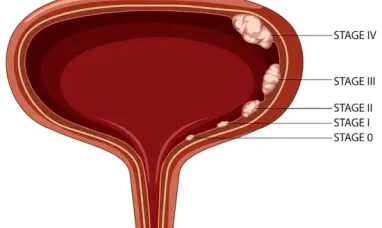Mitomycin C—or Mitomycin-C Kyowa—is a treatment for several different kinds of cancer, including bladder cancer.
In the case of early-stage bladder cancer, mitomycin C is usually administered into a patient’s bladder via a catheter.
As will often be the case, a patient will have a blood test first. This is to check the patient’s levels of blood cells, as well as other substances in the blood. Once this is figured out, the mitomycin C is administered to the patient in the form of chemotherapy, usually over the course of several cycles worth of treatment. The specific treatment plan involving mitomycin C will vary depending on the severity of the cancer.
Common side effects of mitomycin C:
- an increased risk of getting an infection
- experiencing tiredness and weakness—known as fatigue—during and after treatment
- a loss of appetite
- the feeling of being sick
- experiencing weight loss
- bruising or bleeding gums
- nosebleeds
- being breathless and going pale
Less common side effects of mitomycin C:
- inflammation around the drip site
- mouth sores and/or ulcers
- coughing mixed with breathlessness
- a high temperature
- high blood pressure
- flushing of the skin
- changes to the liver
- changes to the kidney
- changes in the nails
- a skin rash
- diarrhea
- constipation
- thinning of the hair
- (in females) periods stopping
Rare side effects of mitomycin C:
- feeling weak
- having an allergic reaction to the drug
- developing a second type of cancer
You should speak to your doctor immediately if you are experiencing any of these side effects.
When mitomycin C is used to treat bladder cancer, the side effects caused will only affect the area of the bladder. This includes the bladder feeling inflamed or sore after treatment. Patients may feel the need to pass urine more often than usual. There is also a small risk of the bladder wall becoming damaged.
If you experience severe abdominal pain, problems passing urine, or blood in your urine, contact a doctor immediately.
Featured image: Freepik @ kjpargeter









